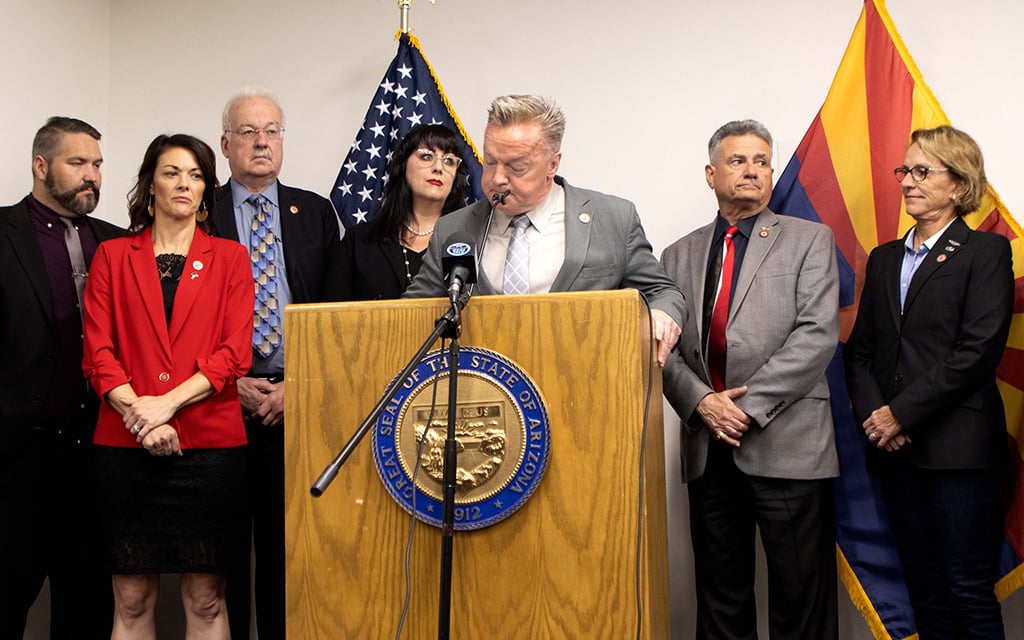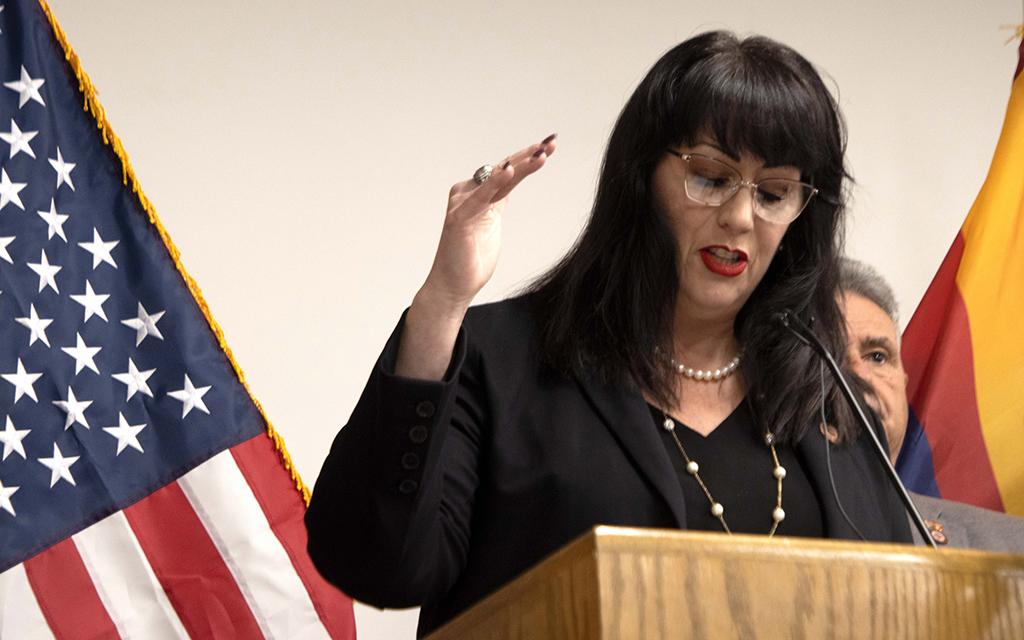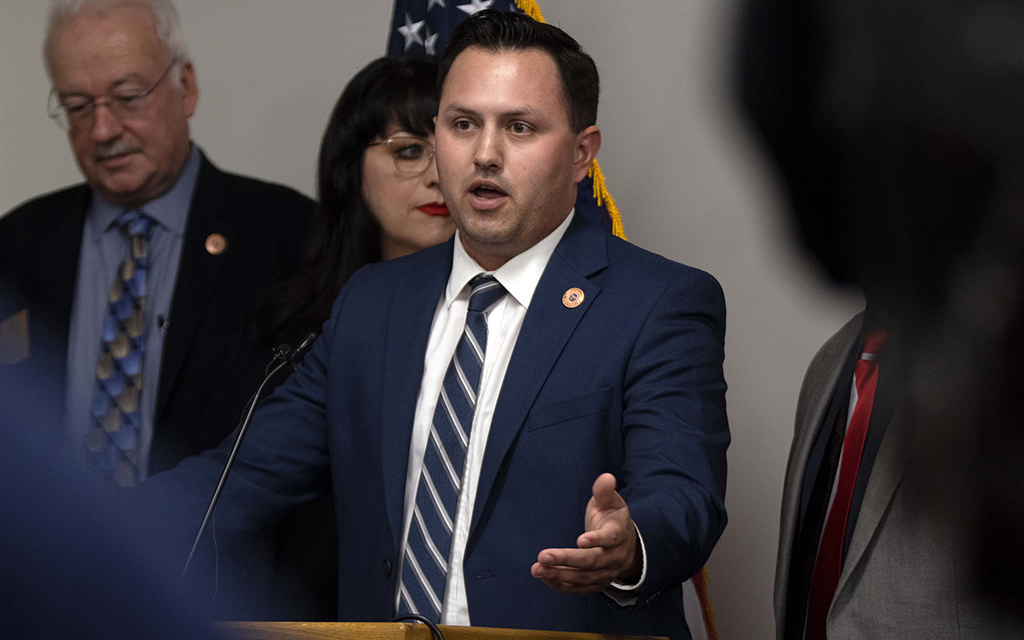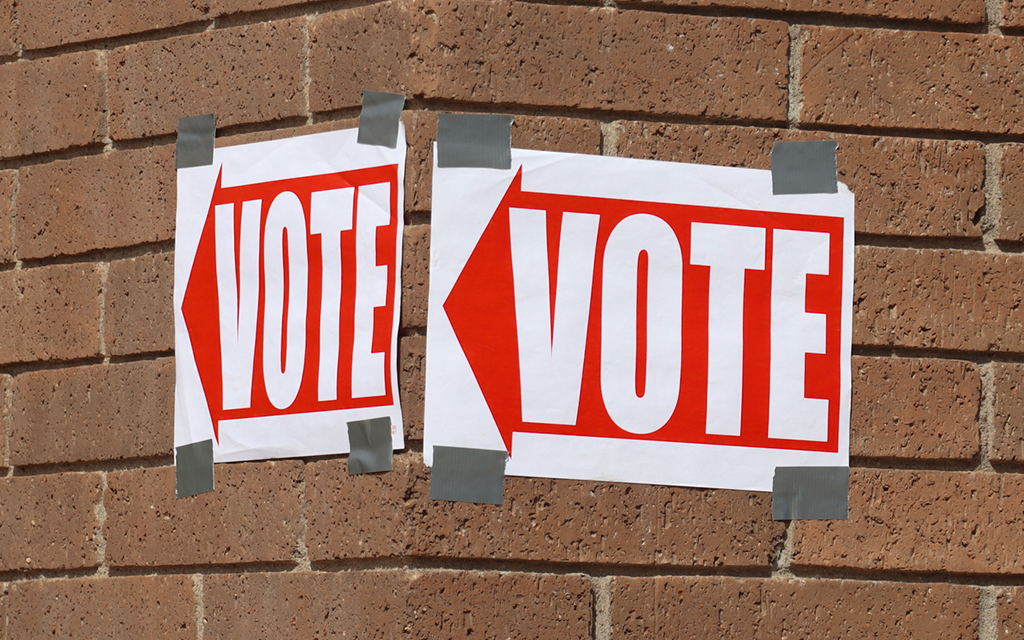
Arizona Sen. Anthony Kern, R-Glendale, speaks about SB 1265, which would prohibit ranked choice voting, during a news conference at the state Capitol on March 15, 2023. “Ranked choice voting, again, should be called rigged-choice voting,” Kern said. “Because it disenfranchises voters and allows marginal candidates not supported by a majority of the voters to win elections.” (Photo by Paula Soria/Cronkite News)

Arizona Sen. Justine Wadsack, R-Tucson, speaks about SB 1265, which would prohibit ranked choice voting, during a news conference at the state Capitol on March 15, 2023. “Unlike the left in America, we are not willing to remove the standards that are necessary to ensure free and fair elections,” Wadsack said. “But we also believe that voting should not be unnecessarily complicated. So why push towards this very complicated voting system?” (Photo by Paula Soria/Cronkite News)
PHOENIX – The Arizona Freedom Caucus wants to preemptively prohibit any use of ranked choice voting to decide city, state, county or federal elections, Republican lawmakers in the caucus said Wednesday morning at a news conference in the state Senate building.
In ranked choice voting — sometimes called instant-runoff voting — voters can rank candidates in order of preference. If no candidate receives a majority after the initial vote, the candidate with the fewest votes gets eliminated, and votes are redistributed based on voters’ second choices, etc. The process continues until a candidate wins a majority of votes.
“Ranked choice voting, again, should be called rigged choice voting,” said Sen. Anthony Kern, R-Glendale, a member of the Arizona Freedom Caucus. “Because it disenfranchises voters and allows marginal candidates not supported by a majority of the voters to win elections.”
Ranked choice voting gained national attention after Republican Sarah Palin lost a special election last year to Mary Peltola, who became the first Democrat in nearly half a century to represent Alaska in the U.S. House of Representatives. Alaska began using ranked voting last year.
Advocates say the process makes those running broaden their appeal to speak to a wider base, making it harder for extreme candidates to win. But it also typically includes an open primary, rather than party-controlled primary elections.
Kern sponsored SB 1265, which says the person who receives the highest number of legal votes is declared elected, and which would prohibit any implementation of ranked choice voting in state, city, town, county or federal elections.
Kern’s bill — which has passed in the state Senate and is now being considered in the Arizona House of Representatives — would also prohibit the tabulation of ballots in any way that eliminates candidates through multiple rounds of counting.
“These important bills would prohibit ranked choice voting in Arizona and ensure that the candidate receiving the most legal votes in an election is declared the winner no matter what leftists groups say,” said Rep. Austin Smith, R-Surprise. He sponsored HB 2552, which mirrors the Senate bill and is having a first committee hearing Monday.
Smith called Republicans who favor ranked voting “misinformed” and said that knowing where candidates stand on positions is exactly the point of elections.
“We want to know where our candidates stand on the Second Amendment and taxes, on the economy and protecting children. Ranked choice voting doesn’t want candidates to do that,” he said.

Arizona Rep. Austin Smith, R-Surprise, speaks about SB 1265, which would prohibit ranked choice voting, during a news conference at the state Capitol on March 15, 2023. “Ranked choice voting delays the election process. Exhausted ballots and elections with ranked choice voting silence voters,” Smith said. “With ranked choice voting, the professional political consulting class would rather pick our representatives than the people.” (Photo by Paula Soria/Cronkite News)
Nonprofit groups Save Democracy AZ and Voter Choice Arizona have expressed interest in ranked voting in the state. Nationally, FairVote.org advocates for ranked choice elections, saying it encourages less divisive campaigns, favors more centrist – or at least less extremist – candidates and improves voter participation.
“I am aware that there are groups in Arizona advocating for ranked choice voting, but this will only lead to chaos,” said Kern who called ranked choice voting “simply too complicated” and “a disaster for Arizonans who are overwhelmingly fighting to reassert our sovereignty in the administration of our elections.”
A 2012 ballot measure in Arizona sought to create a “top two” primary system where the top two vote-getter candidates would advance to the general election no matter their party, but the measure failed.
Sen. Justine Wadsack, R-Tucson, said ranked choice voting destroys the integrity of elections.
“Unlike the left in America, we are not willing to remove the standards that are necessary to ensure free and fair elections,” Wadsack said. “But we also believe that voting should not be unnecessarily complicated. So why push towards this very complicated voting system?”



